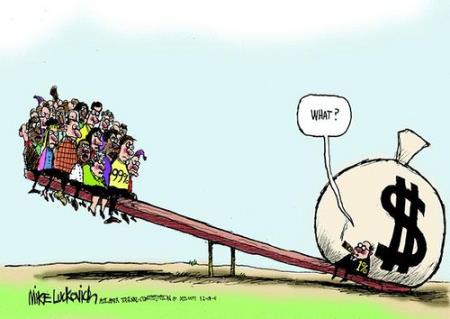by Richard Schulman

Economics columnist and editor John Tamny notes that inequality has surged since 1989 but so has the quality of life for most people. Might there be a connection? Would we have had the benefits of the internet, personal computers, smart phones, and automation without the entrepreneurship and wealth accumulation among the few who made this revolution possible?
The Democratic Party Left want to discourage the wealth accumulation of the rich by taxing it heavily. But if they succeed, won’t this also squash the very entrepreneurship that makes everyone better off? Won’t the non-rich also become more reliant on government transfer payments rather than building their own household stores of wealth? That’s been the European experience, where the countries with the largest welfare states tend to be those with the lowest accumulation of wealth by the non-rich. When governments provide extensive services funded by high taxes, personal household saving is diminished. This is even seen in the US, where retirement savings is much lower than it should be because of people’s unwise reliance on social security.
Progressives argue that inequality of wealth is eroding US democracy — just look at all the millionaires and billionaires (Bloomberg, Trump) running for office, they say. But that more likely is a reflection of the decline of political parties — a result the Progressives themselves brought about by pushing for primaries to replace party caucuses and conventions. Furthermore, the internet has made it possible for candidates of modest means to build formidable campaign funds through mobilizing millions of small contributions, reducing the advantage of the billionaires.
While inequality may have increased in recent years, poverty has plunged, once one assembles better statistics than the incompetent, left-biased US Census Bureau seems capable of assembling. Cato analyst Chris Edwards writes:
In a Cato study, John Early recalculated the U.S. poverty rate using more complete data and found that it fell from 19.5 percent in 1963 to just 2.2 percent in 2017…. Early is a former Assistant Commissioner of the Bureau of Labor Statistics.
Bruce Meyer and James Sullivan perform a similar exercise… They find that the poverty rate fell from 13.0 percent in 1980 to 2.8 percent in 2018.
So which is more important — that poverty is decreasing or that some people are getting very rich by producing goods and services that help bring this about?
Another inconvenient fact is that inequality doesn’t seem to have increased as much as Bernie Sanders, Elizabeth Warren, and their supporters are claiming. The Federal Reserve and others have torn apart the research by Emmanuel Saez and Gabriel Zucman on which Sanders’ and Warren’s campaign claims are based. The Democrats’ pie-in-the-sky spending proposals are ultimately based on the justification that the wealth of the rich is undeserved, worsening prosperity, etc., and therefore should be heavily taxed. But even Rahm Emanuel, former White House chief of staff and mayor of Chicago, warns Democrats to back off these wild spending plans or face avoidable 2020 election losses.
Democrats’ plans to soak the rich with huge tax increases is largely motivated by envy. They would also be counterproductive. They would increase inequality by growing the welfare state, decrease household saving, and lower people’s quality of life by diminishing the production of new goods and services.

Leave a Reply